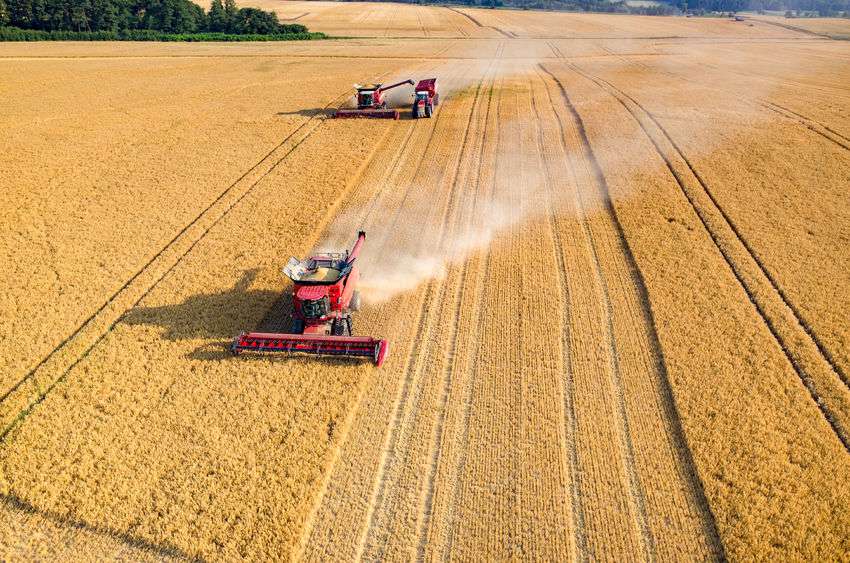
Rent rises are predominantly static at the moment in the face of Brexit uncertainty, says the Tenant Farmers Association (TFA).
James Gray, TFA national chairman, told FarmingUK that most members were seeing little increase in farm rents, although there was evidence of some new tenants being prepared to pay over the odds to get a foot in the door.
"Our members' evidence on renewals is that they are not moving up. They are going nowhere at the moment," Mr Gray said.
The evidence from TFA members is slightly at odds with latest statistics released by the Department for Environment, Food and Rural Affairs (Defra).
Although the Defra figures are for last year - 2016-17 - they indicate that farm business tenancy (FBT) agreements were up by four per cent compared with the year before.
The average FBT rent in England was £219 per hectare, according to the farm business survey for England. Full agricultural tenancy (FAT) agreements were up one per cent at £181 per hectare. Average seasonal agreement rents were £149 per hectare in 2016-17 - down from £162 the previous year.
'Considerable variation'
James Gray said that rent levels could vary wildly from region to region in the United Kingdom and according to the type of land involved. This was reflected in the farm business survey report.
The report said that average rents tended to be higher for FBTs than for FATs, and to be higher in the East of England, East Midlands and West Midlands than in other regions. "There is considerable variation in rents at agreement level," it said.
"This reflects factors such as the quality of the land and that agreements may be for land only or may also include any combination of dwellings, buildings and other assets." Lowest rents were in the North West of England.
Whilst the Defra figures are from last year, the TFA is basing its evidence on regular reports from its members, so may be more up-to-date than the official figures.
"We get our evidence from members," said James Gray. "We have a rent database. When members settle with landlords we ask them to report in so that we know where rents are, rather than relying on anecdotal evidence. Our members' evidence is that they are not moving up. They are going nowhere at the moment."
'At odds'
He said that this seemed at odds with the Defra figures but one possible explanation was that there was anecdotal evidence of some very high levels being settled involving new tenancies.
"It is upsetting to see some of the figures people are prepared to pay to get onto the land," he said.
There was some evidence of individuals being prepared to pay far above the average rate at the moment, he said. "But we are not seeing these increases when it comes to renewals.
"It is difficult to escape the feeling that some agencies may be looking to crank up rents ahead of Brexit knowing that the figures are likely to fall back after Brexit.
"It is not wise for tenants to be settling at the moment, particularly with so many uncertainties." He said it was still unknown what any Brexit deal would look like and farmers were still not sure about what would replace CAP after the UK withdrew.
His words of caution were echoed by TFA chief executive George Dunn, who said: “With all of the current uncertainty surrounding Brexit and future farm policy, now is not the time to be seeking increases in farm rents and it is pleasing to hear that most landlords are responding positively to calls for rent reviews to be put on hold for at least a further year.”
“With Brexit now just a year away, the right time to be looking at farm rents would be the autumn of 2019 or the spring of 2020," he said.
Abstain
The TFA welcomed the decision by the majority of its members’ landlords to abstain from rent hikes in the normal round of spring farm rent reviews this year, although it has said it was concerned to hear of a number of individual cases where landlords and national firms of agents were pushing ahead with what it described as unsustainable rent demands.
“We are hearing some cases where landlords are pressing tenants to agree to rent increases and threatening arbitration if agreement cannot be reached," said George Dunn.
"Each case needs to be looked at on its merits, but we are advising our members not to agree to unnecessary rent increases.”
He said: “The rent review date is only the point at which either the landlord and tenant have to agree or an application has been made for the appointment of an arbitrator.
"The application for an appointment of an arbitrator does not mean that the dispute will proceed to arbitration.
"In well over 90 per cent of the cases where an arbitrator is appointed, rents are still agreed between the parties. The application for the appointment merely extends the time available for negotiations,” he said.
“Rather than having a sterile debate about levels of rent the TFA is encouraging both landlords and tenants to be engaging in dialogue to put in place plans for the post Brexit era.
"Change is coming and is coming fast and landlords and tenants must have a shared vision for addressing that change into the long term."
